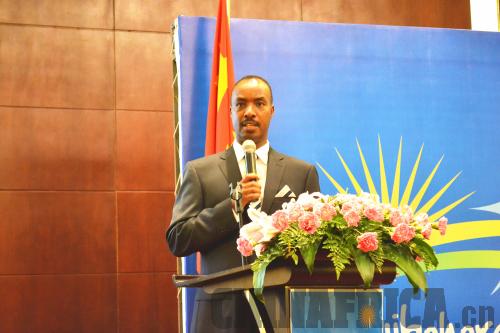| 
Lt. Gen. Charles Kayonga, Ambassador of Rwanda to China
This July 4 marked the 20th anniversary of theliberation ofRwanda. The past 20 years have witnessed remarkable achievements in the economic and social development in the country. Observers believe that the policy of reconciliation adopted by the government after the end of the genocide in 1994 has been key to these achievements, and an example to other African countries as the continent strives for regional integration and prosperity.
At the celebration of the 20th anniversary of liberation held inBeijingon July 7, Charles Kayonga, Ambassador of Rwanda toChina, shared his views with ChinAfrica on reconciliation, economic reform and the country's strategy in the 21st century.
ChinAfrica: How important is your government's policy of reconciliation forRwanda, and Africa as a whole, during its process toward integration?
Charles Kayonga: The 1994 genocide against the Tutsi inRwandacame after three decades of politics of division, hatred and mismanagement. The genocide that was committed against the Tutsi amplified the ethnic hatred and anger as it created a society of victims and perpetrators and, if left unchecked, could easily spiral into a cycle of violence and potentially lead our country to a failed-state status. Thus the policy of reconciliation was important in order to reintegrate society and pre-empt continued polarization and a failed-state situation.
This policy is important for Africa because African countries have suffered the same post-independence mismanagement, including wars setting people against one another. Reconciliation stops the cycle of violence as the aggrieved party puts the interests of the nation ahead of the need for revenge.
Rwandais now one of the fastest growing economies in Africa. What can other African countries learn fromRwanda?
Economic growth inRwandais based first on the successful establishment of peace and security, which is largely a result of inclusive politics and reconciliation. After stopping the genocide against the Tutsi in 1994, the new leadership immediately formed the government of national unity, comprising both people from the victorious party and those who were in opposition, and even [those] in the former government, as long as they did not commit genocide. Even some members of the former government forces were integrated into the new national army. With peace guaranteed, the government went on to pursue sound economic policies, including implementing programs aimed at eradicating poverty and empowering the youth and women. African countries can draw such lessons in good governance and citizen centered politics.
As an inland country which has no oil and few mineral resources, how canRwandafurther develop its economy in the 21st century?
Rwandais focusing on areas where it has a competitive advantage. The service sector for example is one of these areas.Rwandais a beautiful country that is endowed in flora and fauna, including being home to the endangered mountain gorillas. This, coupled with security advantage over her neighbors, is makingRwandaa major tourist destination.
The country is also positioning itself to be the regional hub for meetings and conferences and is establishing the prerequisite infrastructure, including high class hotels, conference halls and the necessary ICT (information communication technology) infrastructure.
But the focus of investment for the 21st century is our human resources, as the government aims at developing a knowledge-based economy. The government has invested in the education of our youth as well as their health and well-being. We have built schools and reorganized the training and education system, meaning all Rwandans will have access to free education for the first 12 years. Education of women has been improved, as the government introduced numerous types of programs and scholarships to support young girls' education.
What is the root cause of the upsurge in terrorism in Africa?
The causes of terrorism that are emerging on our continent are diverse and complex. Some of the root causes can be traced [back to] colonial and post-independence governments' mismanagement of our countries.
Colonial governments were replaced by dictatorships in many countries and their corrupt practices are largely responsible for the ills that ensured sectarianism, including tribalism and religious fundamentalism, poverty, disease, economic underdevelopment and general backwardness, which in turn are the root causes of conflicts and terrorism.
Therefore, terrorism, as well as many of the conflicts on our continent, can be and are being addressed through complex ways, including political and economic ways. But as terrorism is in force, governments are also working to contain it militarily. Governments on the continent are working both nationally and regionally to create structures such as national and regional counterterrorism centers and standby forces for the purpose of countering and combating terrorism.
Of course, governments are aware that finally the defeat of terrorism lies in addressing the fundamental root causes, which will be through political and economic strategies.
|